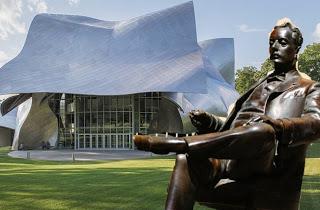Up the Hudson, the Bard Festival revisits Puccini.
by Paul J. Pelkonen

Just a settin' on the lawn. No, that statue of Puccini isn't really there.
Original photo of the Fisher Center © A. Zahner and Co.
The Festival is the baby of college president Leon Botstein, scholar, conductor and imprerio who has made this liberal arts college campus the locus for operas you've probably never heard of, probing weekends exploring symphonic repertory, and scrupulopusly researched productions that create the original effect of the shows presented without leaving the audience scratching their heads.
This summer, Bard will offer its usual July programming initiative: the Bard SummerScape. Its focal point is Iris, a neglected opera by Pietro Mascagni that is (along with Puccini's Madama Butterfly) one of the few operas set in Japan. Mascagni is best remembered for his first opera, the beloved Cavalleria Rusticana. Iris proves that his gifts went well beyond simple tales of bloody revenge.
The Bard Festival proper centers around Giacomo Puccini. Puccini is a paradox: at once one of the most beloved figures of 20th century opera but a composer who, like the late Rodney Dangerfield, gets no respect. Dr. Botstein and his team are out to change this view with programs, panel discussions, opera performances and concerts. Here are some highlights:
On August 7, Dr. Botstein will lead a performance of Puccini's Le Villi, (The Witches) the composer's first opera, paired with the underrated La Navarraise, a bloody one-act work by Jules Massenet.
Aug. 14 is The Turandot Project, an attempt to solve the problem of Puccini's final opera which was left with an incomplete third act following the composer's death. Turandot is a wild fantasy: China re-imagined through the lens of Italian commedia dell'arte with grotesque characters, a blood-thirsty heroine and a brave yet anonymous hero attempting to negotiate love and marriage through a series of baffling riddles.
The Puccini third act (featuring the hit aria "Nessun Dorma") was left unfinished with the composer merely scrawling "And now...Tristan!" on his copy of the score. What Puccini finished will be performed with the new completion by Italian composer Lucio Berio added. Then, the Bard performers will stage Ferrucio Busoni's Turandot, a one-act work which is cousin to the Puccini work.
Other offerings include concerts of opera excerpts, a piano concerto by the forgotten Giuseppe Martucci, and a thorough exploration of the final bloom of Italian operatic virtuosity before the country fell under the boots of Mussolini and his Fascists. The festival will explore Italian music after the war as well, with concerts and discussions of Dallapiccola, Berio, and the now forgotten Futurists.
All this takes place in a serene academic setting on the banks of the Hudson River. Bard is also home to a unique summer attraction: the spiegeltent which oiffers sandwiches, wine and elegant dining in a mirrored temporary structure: a bit like having pre-show dinner under the big top. But fear not, non-drivers: for major festival performances Bard offers MetroNorth pickup or (for some shows only) a free shutle-bus from and to Lincoln Center.

